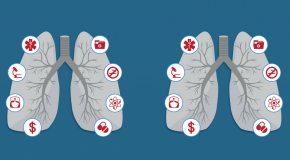Prostate-cancer incidence, prevalence and mortality are rising rapidly in Latin America. Risk factors are highest in Brazil, which has a population that is ageing more rapidly than those elsewhere in Latin America and a greater proportion of males of African descent than in other countries in the region. Studies show that populations of African descent have the highest prostate-cancer incidence rates, for reasons that are still not fully understood. Other risk factors, such as unhealthy diets, are also becoming more prevalent in the region. The rates of incidence of prostate cancer and deaths from this disease are expected to double in the region by 2030, according to The Pan-American Health Organisation.
The economic burden of prostate cancer in the region is growing. If the growing disease burden of prostate cancer is not brought under control, Latin American healthcare systems could come under intense pressure, given that they are already financially stretched. For example, our forecasts show that the economic costs of prostate cancer in Brazil could rise by 50% to US$1.8bn per year by 2022, driven mainly by population dynamics and healthcare spending patterns. Policymakers have been at pains to deal with short-term budgetary constraints, while the potential long-term financial and health-outcome benefits of integrated care have not yet emerged as a priority on the political agenda.
Despite its rising prevalence and economic burden, prostate cancer appears to be a low healthcare priority in the region. Prostate cancer is sometimes considered a neglected disease in Latin America. Partly as a result, late diagnosis is a major problem in the region: a large proportion of patients (over one-half in Brazil and Mexico, according to non-governmental organisations) are diagnosed when prostate cancer is already at an advanced stage. New scientific evidence suggest that active monitoring, with prompt treatment if needed, may be a preferable alternative to radical surgery or radiotherapy for prostate-cancer patients if the disease is confined to the prostate gland.
Latin American countries lack a common response to the threat of prostate cancer. Awareness campaigns have been launched, although early-detection methods have remained controversial. While policymakers in some countries have in the past promoted systematic screening of the male population to detect the disease at an early stage, it has been demonstrated that population-wide screening leads to overdiagnosis and overtreatment and does more harm than good. Instead, policymakers are now encouraging ongoing dialogue between medical practitioners and patients based on symptoms.
For cultural reasons prostate cancer is a taboo issue in many parts of Latin America, undermining early detection and integrated-care solutions. Men are reluctant to go to the doctor and often refuse to talk about prostate-related issues. Their wives and partners have a role to play in encouraging them to address the issue. For example, a leading Mexican anti-cancer activist has suggested that women who go to test for breast cancer take their partners with them to test for prostate cancer.
The notion of patient-centred care is still in its early stages in many parts of Latin America. This is primarily due to the fact that healthcare systems are unable to keep up with demand, given the limited resources currently available in some countries and the major differences in quality between public and private healthcare systems in other countries. Moreover, a lack of multidisciplinary teams and/or integration of these teams in many hospitals is also holding back a shift towards putting the patient at the centre of health decision-making. For example, in Brazil fewer than 20% of public hospitals and roughly one-half of private hospitals have capacity for multidisciplinary care. By contrast, Costa Rica is moving faster in the direction of integrated, patient-centred care. Patient advocacy groups have a role to play in demonstrating the merits of focusing more strongly on patient needs. Some of them have been calling for early detection, expansion of prostate-cancer registries and the adoption of integrated care across the region.
Significant progress is needed in pain management and training in palliative care in order to improve the quality of life of prostate-cancer patients. Oncologists need to be trained to deal with pain-related issues and provide better advice and guidance to patients (such as referring them to pain clinics where available). Efforts to train families to support patients can also contribute to better integration of care. Across the region, many families play the role of caregivers, although they are generally unprepared for the task; in practice, they have to learn by themselves.




